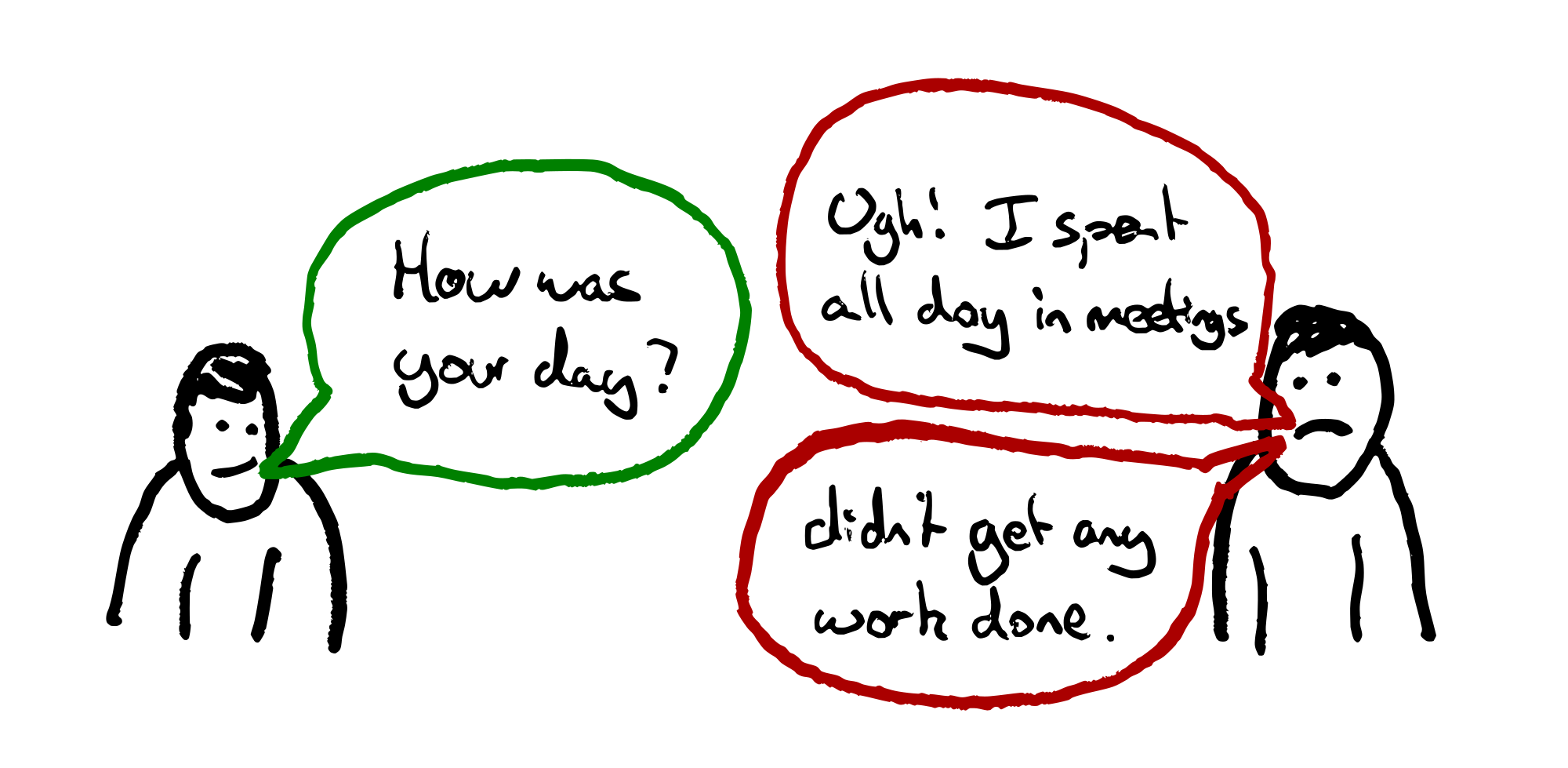“How was your day?” “Ugh, I spent all day in meetings, didn’t get any work done!”
How often have you heard this exchange?
It makes me sad because someone’s day has not been joyful; work can be fun.
I love a whinge as much as the next Brit; maybe if we said what we mean rather than using the catch-all “meetings” we could make work joyful.
Meetings are work
Meetings are work. It’s a rare job where you can get something done alone without collaborating with anyone else. There are some organisations that thrive with purely async communication. Regardless, if you’re having meetings let’s recognise that they are work.
What was it about your meeting-full day that made you sad? It doesn’t have to be that way.
Working together can be fun
I’ve seen teams after a day of ensemble (mob) programming. Exhausted, yet elated at the amount they’ve been able to achieve together; at the breakthroughs they’ve made. Yet a group of people, working together, on the same thing, sounds an awful lot like a meeting. Aren’t those bad‽
Teams who make time together for a full day of planning, who embrace the opportunity to envision the future together, can sometimes come away filled with hope. Hope that better things are within their grasp than they previously believed possible.
Yet the more common experience of meetings seems synonymous with “waste of time” or “distraction from real work”. Why is this? Why weren’t they useful?
One team’s standup can be an energising way to kick off the day. Hearing interesting things we collectively learned since yesterday Deciding together what that means for today’s plan; who will work with whom on what?
For another team it may be a depressing round of status updates that shames people who feel bad that they’ve not achieved as much as they’d hoped.
How do we make meetings better?
A first step is talking about what did or didn’t work, rather than accepting they have to be this way. Because there’s no “one weird trick” that will make your meetings magical. You’ll need to find what works for your team.
Why should you care? You probably prefer fun work. If you could make your meetings a little more fun you might enjoy your work a lot more.
Meetings beget meetings. Running out of time. Follow-ups. Clarifying things that were confusing from the first meeting… Ineffective meetings breed. Tolerating bad leads to more misery.
Saying what we mean
Here’s some things we could say that are more specific
We didn’t need a meeting for that.
Was it purely a broadcast of information with no interactivity? Could we have handled it asynchronously via email/irc/slack etc?
I didn’t need to be there
No new information to you? Nothing you could contribute? If you’re not adding value how about applying the law of mobility and leave / opt out in future. Or feed back to the organiser. Maybe they’re seeing value you’re adding that you’re oblivious to.
I don’t know what that meeting was for
How about we clarify the goal for next time. Make it a ground rule for future meetings. If it’s worth everyone making time for it’s worth stating the purpose clearly so people can prepare & participate.
It wasn’t productive
Was the meeting to make a decision and we came out without either deciding anything or learning anything?
Was the meeting to make progress towards a shared goal and it feels like we talked for an hour and achieved nothing.
Perhaps we’d benefit from a facilitator next time.
It was boring
Can we try mixing up the format? Could you rotate the facilitator to get different styles? How can you engage everyone? Or does the boredom indicate that the topic is not worth a meeting?
If it is important but still boring how do we make it engaging? It’s telling that “workshop” “retrospective” “hackathon” and other more specific names don’t have the same connotation as the catch-all “meetings”. Just giving the activity a name shows that someone has thought about an appropriate activity that will engage the participants to achieve a goal.
I needed more time to think
Could we share proposals for consideration beforehand? Suggest background reading to enable people to come prepared? Allocate time for reading and thinking in the meeting?
It was too long
We could have achieved the same outcome in 5 minutes but ended up talking in circles for an hour.
I didn’t hear from ____
Did we exclude certain people from the conversation, intentionally or unintentionally? What efforts can you make to create a space for everyone to participate?
Not enough focus time
Do you need to defragment your calendar? Cramming in activities that need deep focus in gaps between meetings is not a recipe for success. Do you need to ask your manager for help rescheduling meetings that you can’t control? Should you be going to them all or can you trust someone else to represent you?
Too many context switches
Even if you don’t need focus time, context switching from one meeting to another can be exhausting. Are you or your team actively involved in too many different things? Can you say no to more? Can you work with others and reschedule meetings to give each day a focus?
It wasn’t as important as other work
Maybe you’re wasting lots of time planning things you might never get to and would be better off focusing on what’s important right now? Is your whole team attending something that you could send a representative to? Perhaps reading the minutes will be enough.
Highlight the value
We decided on a database for the next feature
We learned how the production incident occurred
We heard the difficulty the customer is having with…
We made a plan for the day
We shared how we halved our production lead time
We realised that our solution won’t work
We agreed some coding principles
Tackling your meetings
What’s your least valuable meeting? Which brings you the least joy?
What’s your most valuable meeting? Which brings you the most joy?
What’s the difference between these? What made them good or bad.
Turn up the good; vote with your feet on the bad.

